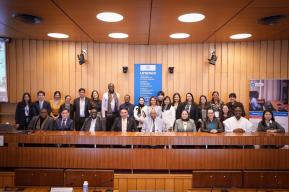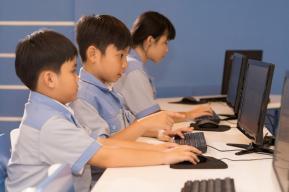News
UNESCO supports the digital transformation of education in Small Island Developing States

More than 200 participants joined a UNESCO-convened discussion on 4-5 April about how to capitalize on the potential of digital technologies in education in the Small Island Developing States (SIDS). The SIDS face huge challenges in fully utilizing these technologies due to complexities of connectivity in the remote and often sparsely populated countries.
Due to their geographies, scattered over large oceans, the provision of basic services such as education can be challenging, especially due to their exposure to natural hazards that can result in prolonged absences of students, disruption of classes and education losses. These difficulties are even more acute for reaching universal digital learning.
In the Atlantic, Indian Ocean and South China Sea (AIS) and the Caribbean regions - with a population of around 47 million dispersed across 22 countries - more than a fifth of the population, some 9.4 million people, are not active internet users. The situation is even more severe in the Pacific region where only an estimated one third of the population regularly uses the internet. Like in other regions of the world, the COVID-19 pandemic interrupted education in SIDS, highlighting the pre-existing digital divide.
It is against this backdrop that UNESCO brought together over 40 speakers from 25 countries, including Heads of States, Ambassadors and other high-level representatives from SIDS and beyond, as well as experts, policymakers, and other stakeholders to discuss strategies and solutions for addressing the challenges related to the digital transformation of the education systems in SIDS. Participants from around 70 countries, including 18 SIDS countries, joined online and in person at UNESCO Headquarters in Paris over the course of the two days.
Transforming education in the digital age
The sessions addressed issues related to education transformation information in the digital age. Digital technologies have been proven to be crucial in building inclusive knowledge societies. Increasing usage and users of new technologies has a significant impact on how information is produced, used, archived and shared. Participants discussed how to best adopt technologies to ensure that such innovations are used for the common good, to enhance human rights and inclusion in line with the 2019 UNESCO Recommendation on Open Educational Resources.
Speakers addressed how they could adapt UNESCO’s 2022 Guidelines for ICT in Education Policies and Masterplans and the 2021 AI and Education: Guidance for Policy-makers to strengthen planning frameworks at the national level. It was also the occasion to discuss policy areas such as Media and Information Literacy to ensure that learners have the critical skills to engage with diverse content and digital technologies, and digital open schools to support learning institutions to become more resilient to shocks. UNESCO also presented the new Gateways to Public Digital Learning initiative, in collaboration with UNICEF, an ambitious project to provide a platform for all learners, educators and parents to be able to find high-quality, curriculum-aligned content.
Harnessing UNESCO’s expertise across education, science and, communication and information, the session entitled “Transformation of Education in the Digital Age” was the 2nd Global SIDS Dialogue, (following the 1st edition in October 2022 on Disaster Risk Reduction) and was organized in line with the UNESCO’s Strategy on Technological Innovation in Education 2022-2025 to leverage technologies and digital innovations to ensure more inclusive, effective and relevant learning. The UNESCO Global SIDS Dialogue series provides a platform for SIDS to share their experiences and ideas on how to tackle the challenges they face, including climate change, biodiversity loss, and economic development. The aim of the Dialogues is to foster greater collaboration and partnerships between stakeholders in SIDS, as well as with other organizations and institutions. By strengthening such collaborations, efforts can be redoubled to contribute to achieving the provision of education as a human right by ensuring universal access to high-quality digital learning.







